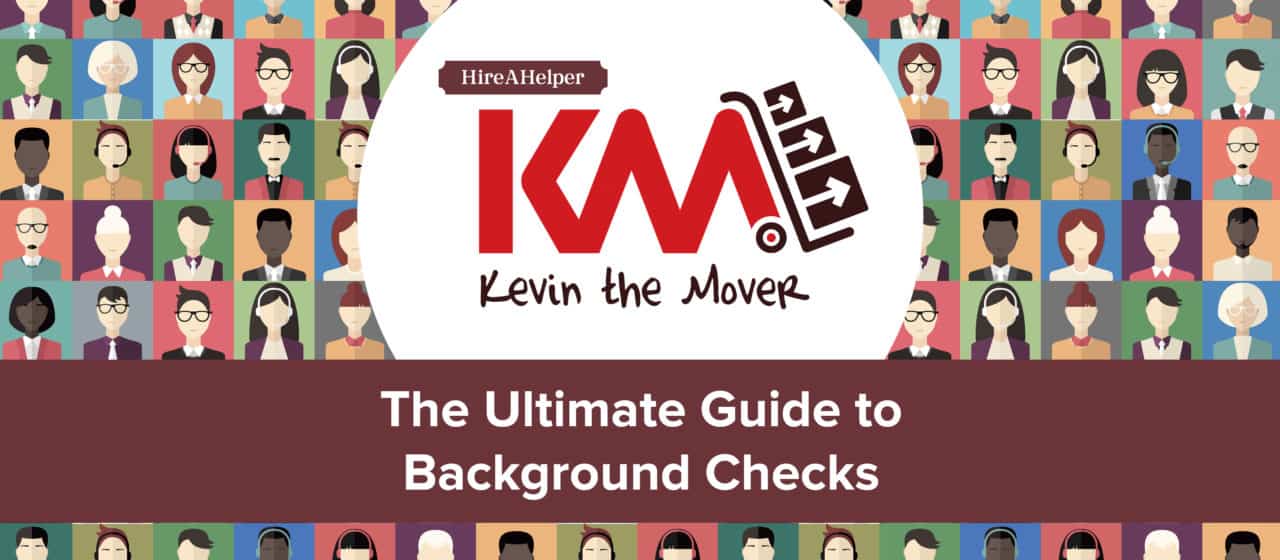The Ultimate Guide to Background Checks
Posted in: I'm a Mover, Business Basics, Operations[Synopsis: Performing background checks can be tricky. Here are the basics to help get us through.]
For their move from New Brunswick to Newfoundland, one major concern for Lydia Lewycky and Tom Horrocks was that their movers be thoroughly vetted. This was a big reason they hired Premiere Van Lines, whose “No Stranger in Your Home” policy states that that all moving consultants, professional van operators, packers/unpackers and loading/unloading crew members are background-checked before they are hired.
Unfortunately for Lydia and Tom, one of their movers was not checked for any criminal history. A week after their move, they discovered that $17,000 worth of jewelry was missing from a box they transported to their new home – after having left it unattended for several hours in a bedroom while the movers were working.
Claims were filed, movers were interviewed, the police investigated, and Premiere’s insurance company looked into it (though how closely we’ll never know). In the end, no evidence was found to connect any of the movers to the theft. The couple found themselves out of options, out of luck and out a whole lot of diamonds and pearls. Premiere may not have been held liable, but they may still see losses, in revenue and in their reputation.
This is why performing a background check is the only way to get the complete picture on people looking to work for a moving company.
So what does a background check entail?

The answer might seem obvious, but there are a lot of factors – and legalities – that go into the procedure. “Doing a background check” does not equal “requesting a criminal record”.
When hiring people we may also want to consider:
- Demographic and Educational background
- Employment history
- Driving history
- Criminal history
How do we do this? We have them tell us on their application, we ask them questions in an interview and for a more complete and reliable picture, we do a little digging.
“Do a little digging? Sounds kind of shady.”
That can become shady, but we’re not talking about tapping people’s phones and hacking their Facebook accounts. Looking into an applicant’s background is an important, if not a critical part of the hiring process. And while there are plenty of rules, the US Equal Employment Opportunity Commission tells us flat out that: “…except for certain restrictions related to medical and genetic information, it’s not illegal for an employer to ask questions about an applicant’s or employee’s background, or to require a background check.”
“Okay, so it’s not illegal. But how do I get the information I need without breaking all those rules from that link up there?”
Glad you asked.
Setting Up Your Background Check

A background check starts with making an application for your prospective employee to fill out. Aside from the basic information on education and work experience, there are a few crucial questions we need our applicant to answer right off the bat:
- Are you legally authorized to work in the US? All we are looking for here is a simple “Yes” or “No”. We’ll dig into this further down.
- Do you consent to a background check? Again, a simple “Yes” or “No” will suffice. Although the Equal Employment Opportunity Commission (EEOC) states it is not illegal to ask about an applicant’s criminal background or to require a background check, the legality of obtaining consent for a background check is murky. If your “digging” is limited you don’t need consent, but obtaining an applicant’s consent can cover you if any privacy or discrimination issues arise later on. And if the applicant says “no”? You as an employer have the right to disqualify that applicant from further consideration.
- May we contact your present employer? This Yes/No is a simple matter of privacy for the applicant, who may not want their present employer to know that they are looking for another job. A “No” should not necessarily be cause to view the applicant negatively.
- Have you ever been convicted of a crime/felony/misdemeanor? This is such a common question we might not stop to think if it is legal to ask.
Ban the Box

Many are calling for legislation to ban the criminal history question entirely from job applications. The “box” refers to the simple “Yes” or “No” applicants are forced to check as an answer to this sensitive and potentially ruinous question. For some legalese on the subject of removing this question about criminal history from the initial hiring process, scroll down to Page 54 (page 14 of the pdf) of this article from the Journal of Law and Criminal Justice.
A special consideration straight from the EEOC: “Federal law does not prohibit employers from asking about your criminal history.” However they also warn,
“Several states’ laws limit employers’ use of arrest and conviction records to make employment decisions. These laws may prohibit employers from asking about arrest records or require employers to wait until late in the hiring process to ask about conviction records.”
To get the basic criminal history laws for each state check this resource page by Nolo.
We’ll get into how to actually conduct criminal background checks in a moment. But let’s start out with some easy stuff.
First, Reference Checks

Making phone calls to an applicant’s former employers can prove invaluable in gaining a sense of what said applicant is like as an employee and a person. Checking factual information (dates of employment, salary and job duties for example) is pretty straightforward and perfectly legal, as are inquiries into job performance, work-related skills, workplace habits and usually – but not always – reasons for employee’s separation (downsizing, firing, quitting, etc.) from the company.
Each state has its own rules for what former employees are allowed to disclose in a reference check interview.
“Okay, how do I figure that out?”
Legal publisher Nolo gives a rundown of the laws and regulations in many states regarding what employers can say about former employees, so when you make that reference check phone call you’ll know ahead of time what sort of information you’ll be able to get.
As far as what kinds of questions are generally helpful to you, Hcareers and DRG both offer their own list of 10 questions to ask. DRG notes:
“Make certain that all of your questions relate to the position for which you are hiring, and that you follow the same procedure for every candidate. Because even if all our questions are strictly legal, if we exhibit any sign of discrimination among the applicants we handle that could land us in some hot water.”
In other words, don’t dive into all the nitty-gritty background details of only one group of applicants (based on race, nationality, gender, religion etc.) Don’t be that employer.
Second, Driving Records

If (and only if) driving a vehicle will be part of the job you are hiring for, the importance of checking the applicant’s driving record comes into play in two ways:
- We want to know if the applicant has had their license suspended or revoked, if they have any serious offenses on record and that the driver’s license the applicant submitted hasn’t been falsified in any way.
- Having done our check, and finding the applicant’s record clean, we are also protecting ourselves against a claim of negligent hiring in case something does happen out on the road.
Is it lawful to ask for or obtain an applicant’s driving record? Business Management Daily says yes, “…as long as you limit your request to information about driving convictions, rather than arrests.” Just because someone was arrested for driving under the influence does not mean they were found guilty of the same.
Using an arrest – in any case, not just in a driving-related situation – to disqualify an applicant can lead quickly to a lawsuit. Just remember, adds the BMD: “The EEOC says employment decisions based on criminal histories that are unrelated to the duties the applicant would perform if hired are subject to legal scrutiny.” In other words, considering an applicant’s driving record for a position that does not involve driving – office staff, for example – is best avoided.
To make requesting a driving record for an applicant super easy, the State of Nevada’s DMV website offers links to the appropriate agencies for all 50 States.
Now About Getting Those Criminal Background Checks

PeopleSmart maintains an impressive resource that includes information and procedures on obtaining criminal records for each of the 50 States, broken down further by county.
Depending on your own preferences and resources, you may want to have a third party do the criminal checking for you. This is legal as well, and there are plenty of entities out there ready and willing to serve you, including us! Yup that’s right, we make it easy for you to background check your crew members right from your HireAHelper account. Plus, since HireAHelper runs so many background checks, we’ve negotiated large discounts for you, so it will most likely be cheaper than other places.
If you’d still like other resources, Business News Daily recommends GoodHire. Another resource is BackgroundChecks.com. (However, background checks through HireAHelper are $20 and cover the same level of inspection as GoodHire’s “Standard Check” at $60.)

HireAHelper uses background checks to fuel its “Elite Movers” service. In addition to needing a 4.5 average customer rating, movers who provide workers that are both uniformed and background checked are eligible for “Elite Movers” status. This makes your company more likely to get jobs, as it assures a strong standard of safety for all customers searching the database!
BUT…once you hire a third party to run an applicant’s background check, you are subject to additional regulations and requirements. Namely, the EEOC stipulates that the employer must obtain the applicant’s written permission before getting a third-party report. (The applicant can refuse, though the employer can then reject the applicant based on such refusal.) Also, if there is something in the report that could negatively affect the employer’s hiring decision, the employer must provide the applicant with a copy of the report and supply information on that third party, including means of contact.
Sound easy enough? Good.
Because now comes the tricky part.
Title VII of the Civil Rights Act of 1964 forms the foundation of the laws set forth by the EEOC in guarding against discrimination in the workplace. Within this Act, the EEOC is very clear in saying that it is illegal to do background checks on some prospective employees and not others “when that decision is based on a person’s race, national origin, color, sex, religion, disability, genetic information (including family medical history), or age (40 or older).”
That this is the busy season and you are pressed for time and can’t afford to run checks on everyone you are interviewing at the moment may very well be true and honest. But that line of reasoning may not fly in the face of a discrimination lawsuit.
So not only is it a no-no to do background checks on some applicants and not others, but how you apply the information you get from those checks must also be consistent.
This EEOC webpage offers a boatload of information on the subject, including some examples to illustrate the practical application of these laws. Pick through their webpages for more information and examples, and arm yourself with the knowledge you need when deciding whom to hire.
So what if we find out an applicant has a criminal record?

EEOC guidelines require employers to give applicants the chance to explain the circumstances of their criminal records, including information about whether they already proved they could do the same sort of work for which they’re applying, and whether they had gotten rehabilitation services or other training.
Forbes offers us some highly pertinent legal information for when a background check does show that an applicant has a criminal history. We must consider (1) the nature of the crime, (2) its relation to the potential job, and (3) the time that has passed since the offense.
From the Forbes article:
“Employers can’t turn away potential employees simply because of a long-ago conviction for mortgage fraud, for instance, if they are hoping to work in an auto warehouse, or a drug charge if they are applying to be a store cashier…”
Final Notes
Every customer wants to know that their belongings are in the hands of honest, trustworthy individuals. That is why we stress the importance of background checks on all applicants. We want our customers to be able to have full trust in every mover in the HireAHelper community.
Here are all the previous resources again, indexed for your convenience.
Nolo: Laws on references and statements by former employers, by state.
DRG Consultants: List of 10 important questions for references.
DMV Nevada: Obtaining driving records, by state.
PeopleSmart: Obtaining criminal records, by state.
This EEOC webpage: Examples of equal opportunity laws in action.
US Citizenship and Immigration Services (USCIS) Form I-9: Mandated first day form for all US employees.
E-Verify: Government tool used for citizenship work qualifications.




